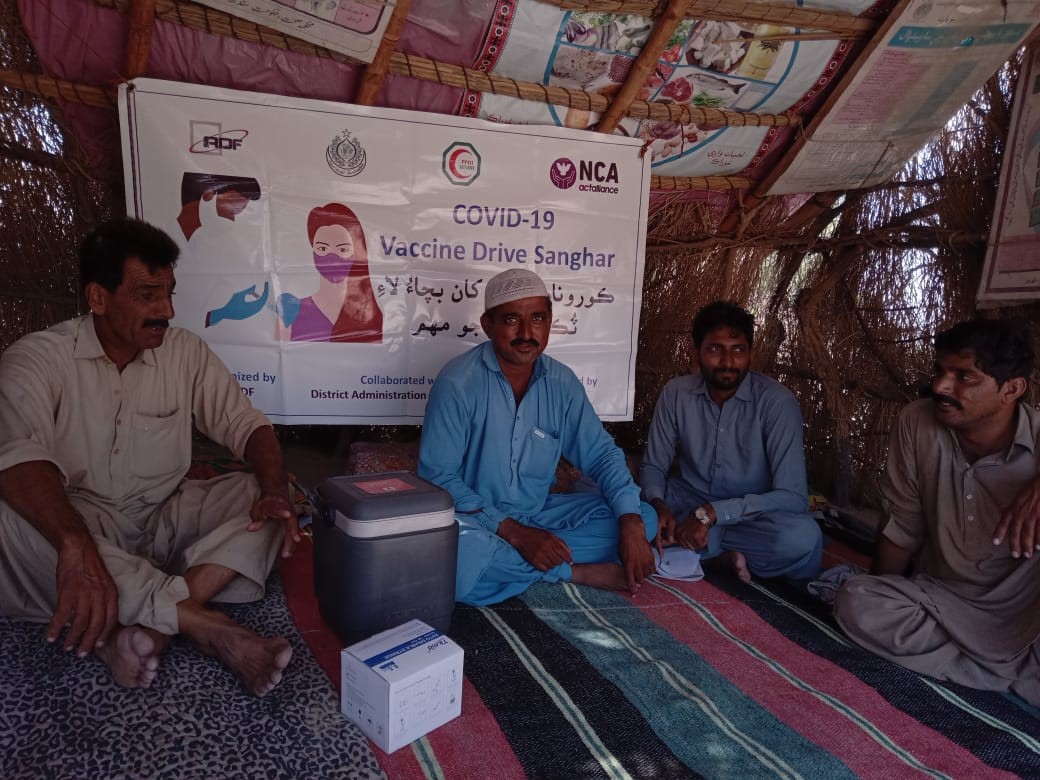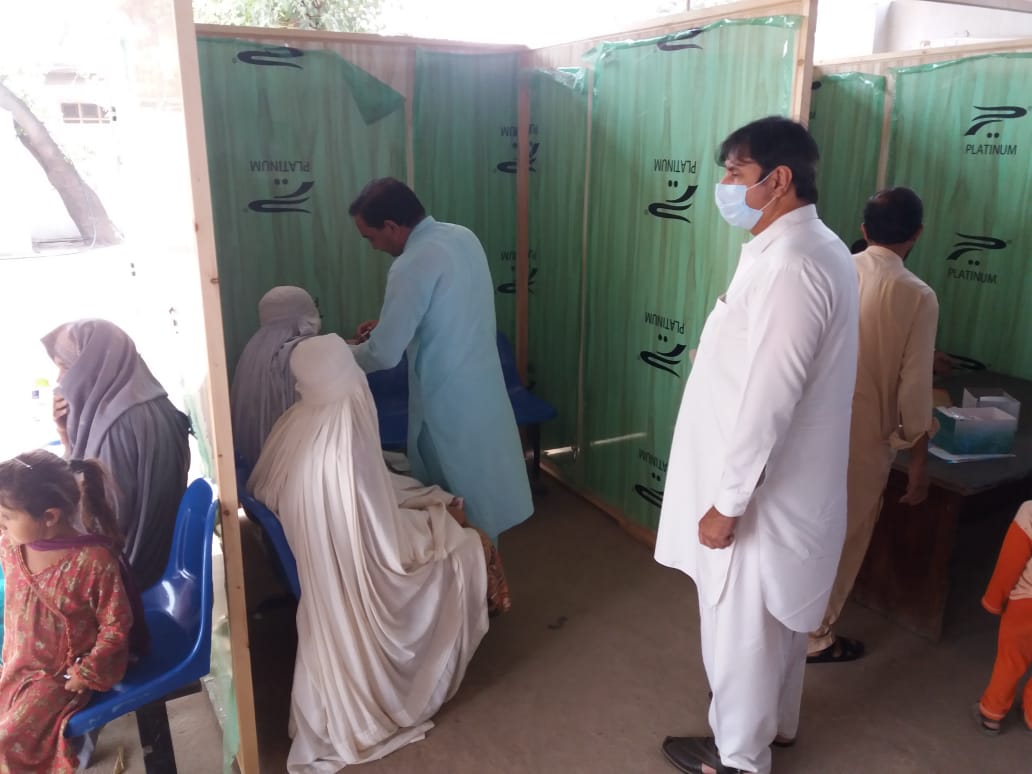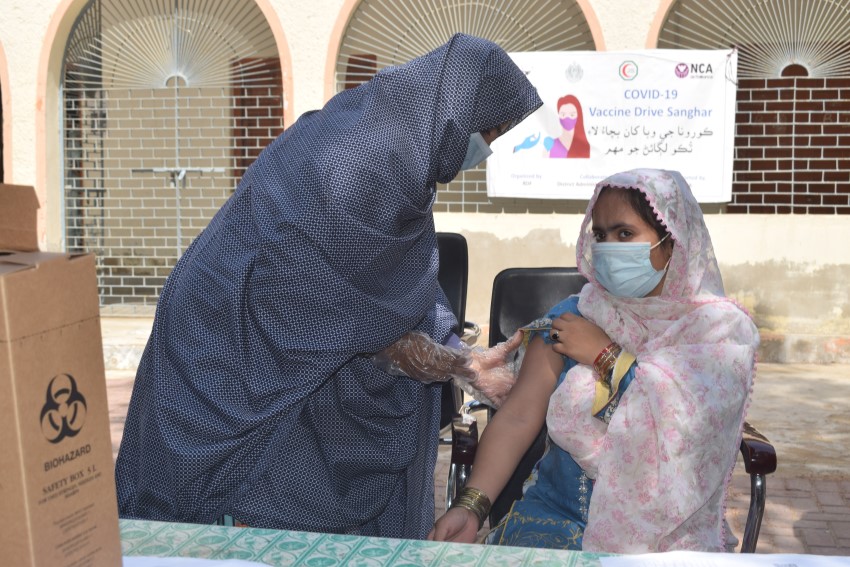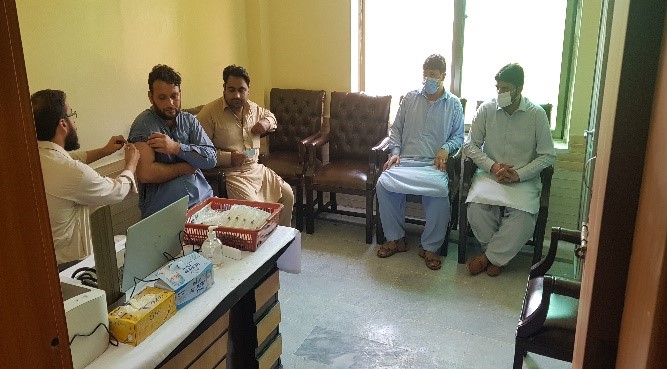
In Pakistan, NCA's partners are supporting the Government in persuading masses to receive a vaccine. The picture is from a mobile camp at teshil Sanghar of Sindh, Pakistan.

In early 2021, Government of Pakistan launched its COVID-19 vaccination campaign- one year after the first case was reported. According to Government statistics more than 77 million people out of a total population of 210 million, i.e., 34% of the population have had two vaccine doses till 18 January 2021. National Command and Control Center (NCOC) of Pakistan is managing vaccination drive and is nerve center to procure and supply seven approved vaccines across Pakistan.
From the onset of the vaccination drive, NCA's partners are supporting the Government in persuading masses to receive a vaccine. Some of the intervention partners have carried out includes awareness raising about vaccine, mobile vaccination, strengthening of health facilities and data collection on vaccination.
COVID-19 vaccine hesitancy was a real challenge amid all the rumours and disinformation about the vaccine. The reluctance stemmed from myths such as the pandemic being a foreign conspiracy, the virus being harmless or the vaccine triggering infertility and shortening life expectancy.
"There were hardly five to six males for vaccination each day, only 1.6 percent of population was vaccinated. It was getting challenging for us to reach out the entire population of the village and cases of COVID-19 were rising day by day," said Dr. Fozia of Basic Health Unit (BHU) in village Faqeer Kallay of district Peshawar.
The hesitancy of people to get vaccinated was not only based on myths but also on cultural restrictions, like there was no separate vaccination booth for women in BHU.
NCA along with its partner Peace and Development Organization (PADO) supported the district health department of district Peshawar to vaccinate people in the Faqeer Kallay village, with a population of 55,900 persons. To counter myths and misinformation, NCA's partner involved religious leaders to deliver sermons to remove doubts and fears as part of its awareness campaign.
NCA's response also included the installation of hand washing station in Basic Health Unit along with a water storage facility. Especially, separate vaccination booth and waiting area were set up for women of the area.
"With timely and effective efforts of NCA and PADO, we are able to fully vaccinate 67% of the population of the village",said Dr. Fauzia with excitement.

A separate vaccination booth for women, Peshawar, KP.
The COVID-19 pandemic has hit some of Pakistan's most remote and hardest to reach areas. "This is an incredibly underserved and at-risk population," said Rab Nawaz, village activist and teacher of Sanghar District of Sindh. The underserved population of Sinjhoro and Sanghar were lagging in rates of coronavirus inoculation.
NCA with its partner Rural Development Foundation (RDF) supported district health department to reach every village of Sinjhoro and Sanghar tehsils. The providers set up mobile camps in 45 villages and made sure 6,070 eligible individuals dispersed over a vast area received two doses of vaccine.
RDF also provided logistics to the health department in reaching out to the remote villages in the desert area of union council Kamil Higoro, to vaccinate 435 persons who did not have access to health centers. In addition, four rural health centers in district Sanghar were strengthened by the installation of a proper hand washing station, waiting area, and vaccination booth. These improvements and basic facilities facilitated to administer vaccination to almost 100,000 individuals.
"We were so grateful to get vaccine, and I am happy that all adults in my village are fully vaccinated", said Rab Nawaz with satisfaction.


In Swat district of Khyber Pakhtunkhwa, for a population of more than two million there were only 12 vaccination centers. "The health department was under severe pressure to vaccinate as many people as possible. To cope with the challenge, the health department wanted to establish new vaccination centers in existing health facilities," said Dr. Muhammad Salim District Health Officer (DHO)- Swat.
NCA through its partner LASOONA came forward to expand the response capacities of the health authorities through establishing four vaccination centers. The NCA partner also provided furniture, laptops, IT technology equipment, medical equipment, refrigerators, and water dispensers. It increased the response capacity of the health department in maintaining high rates of immunization. Since the establishment of vaccination centers about 170,000 people got vaccinated. Importantly, laptops donated to each vaccination center, played a crucial role in collecting data of vaccinated people and sharing with a window operation at NCOC i.e., to collate, analyze, process information and issuance of immunization certificate for COVID-19 vaccinated people.
"NCA's timely assistance helped us in smooth and quick vaccination. The assistance reduced pressure on the healthcare system," said Dr. Muhammad Salim District Health Officer (DHO)- Swat.
Recently rise in national positivity rate has been observed as the Omicron-driven fifth wave hits the country. According to government statistics of 18 January 2022, 4,340 positive cases are registered in the last 24 hours. Vaccination is one of the most successful preventive measures against COVID-19 but only one third of the total population is vaccinated and still a significant amount of the population is vulnerable to COVID-19. There is an urgent need to speed up the momentum of vaccination drive, especially for the poorer and inaccessible rural and urban population of Pakistan.
Photo credit: NCA Pakistan.
Published: